Just hearing the word "tick" or seeing it in print anywhere is enough to garner an immediate gag response, and the outdoor community knows it all too well. Ticks can carry Lyme disease, babesiosis, ehrlichiosis, tularemia, Powassan virus, and anaplasmosis to name a few. Short of keeping them off your person, getting them off your hunting property and keeping them off is paramount. Sure, this is a process that might seem a bit like shoveling water, (an endless thing that never seems to get you anywhere) but the truth is that there are ways to at least keep the little bloodsuckers at bay slightly. Make no mistake, I'm right alongside the millions of folks who have used some kind of insect repellent that was made from 100 percent DEET. There's no denying that stuff works. However, it's still a largely chemical solution and who really knows what kinds of side effects there may be both for ourselves, our hunting land, and the animals that live on it down the line? It got us thinking that there must be a better way. Which is why we're looking at totally organic and non-chemical methods of controlling ticks in your hunting areas. No solution is going to be totally effective in eliminating all ticks, but these five methods can make a difference in cutting down the number of ticks, which is good not just for hunters, but the animals that live on your land too.
1. Tick Repelling Plants

Getty Images: Danil Bukharov
You've probably heard of garlic, mint, sage, lavender, rosemary, and marigolds, but we doubt you thought of spreading them around your hunting property. All these plants have one thing in common. They all have a history of being repugnant to our common enemy, the tick. These plants are great to use in border areas as a sort of natural barrier. Some ticks will still likely get past while attached to animals crossing the border. Still, landowners can place easy growing items such as mint in common areas to help reduce the odds of one crawling on you, especially when you're hunting turkeys in the spring or doing maintenance work in the summer months. We recommend using plants like mint and lavender in small, strategic amounts since deer don't like the smell of the stuff much either. For those who have it available to them, downed cedar, or better yet cedar chips, make a great barrier along borders or near treestands and blinds. Cedar and its oils are a natural tick repellent.
2. Bust Up Tick Habitat

Getty Images: Janine Lamontagne
Overgrown plants and long grasses are ideal places for ticks. We recently spoke to tick expert "Tick Man" Dan Wolff, who told us ticks prefer warm, moist areas and leaf litter. He recommended keeping lawns cut short because to avoid providing them something close to their preferred habitat. Keeping trails open by constant pruning is important for property owners. Mowing to avoid tall grass over the summer will provide natural barriers and corridors for travel without worrying about picking up more of these parasites. Try to remove or burn brush or wood piles (when and where it is legal). If that's not an option, try to limit them to hot, dry, sunny areas where ticks are less likely to live.
3. Tick-Eating Wildlife
Tick gobbling creatures like robins, bluebirds, and jays should be welcomed to your property with open arms. If you need a little help, consider adding some bird feeders in strategic locations where ticks have been a problem in the past. Just make sure to look up your state's laws on baiting of game to make sure a feeder won't fall under that umbrella. However, the best tick destroying critter out there might just be the opossum for its ability to gobble up and neutralize these little biting vermin. Trying to attract opossums to your land probably isn't realistic. We do suggest you leave them alone and allow them to do their work if you encounter them. They prefer to move around at times when we are usually not present anyway. If they are seen, give them a chance to escape and let them linger, and you might just see a decrease in ticks.
4. Spray with Natural Oils

Getty Images: Stephanie Dudek
This is a bit outside the box, but you consider natural substances like cedar oil and eucalyptus oil. Most of these are used as a spray you apply to your skin to repel ticks before they ever have the chance to attach to you. Many "green" pest removal companies now provide customers with a yard-wide application of these same oils. There are also commercially-available mixtures administered with a sprayer that can get the job done. Property owners can make their own blend of these oils stronger by concentrating the mixture with other substances like witch hazel for use around their land. The cedar oil helps kill ticks already there by suffocation, and the witch hazel acts as a repellent to keep others from moving in after treatment. The consensus is that you will need around five applications per season, depending on factors such as rain, but it is one of the easiest ways to do it.
5. Coffee

Getty Images: Oksana Osypenko
More specifically, we're talking about coffee grounds, which can repel everything from fleas and ticks to ants that would love to come inside your ground blind. The only downside is that it won't kill ticks. Still, it is a simple process of spreading them around areas that you would like to keep ticks away like your treestands, blinds, and trails. Seeing as how most of us drink so much of it, there should be a near endless supply of it, and the best part is how long it seems to last: I treated my house foundation after years of having ants in my bathroom, and I never saw them again, even years later. It's a worth a try in your hunting area at the very least! Just be wary of the smell, and remember how strong a deer or other game animal's olfactory sense can be.
And Finally, The Targeted Approach

Getty Images: Kerrick
Since there really seems to be no way to utterly stop them in their tracks, handling these little blood-eating varmints with the kid gloves off is the only way to defeat them. Enter permethrin, the go-to substance for many looking to bypass the repellants, and go straight for the kill. You can cover your clothes and boots with permethrin, and ground blinds, gear bags, and blind chairs. One interesting alternative method we'd recommend is "Tick Tubes" which are essentially cardboard tubes stuffed with a type of cotton that is treated with permethrin. Since we know that mice are one of the worst carriers of ticks, Tick Tubes contain cotton that mice take back to make their nests, where the chemical will kill any attached ticks. This product works with nature and can treat a large area.
While no method may be perfect, having a good hunting property comes with some hard work. Part of that should be our willingness to do that maintenance by the most natural means possible. We owe it not just to ourselves, but the animals that live there too.
Please check out my book "The Hunter's Way" from HarperCollins. Be sure to follow my webpage, or on Facebook and YouTube.




